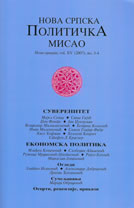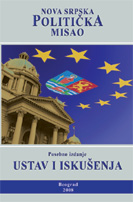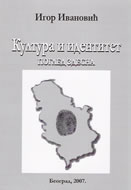| NSPM in English | |||
A Tale of Two Subversives |
 |
 |
 |
| понедељак, 16. новембар 2009. | |
|
(Chronicles: A Magazine of American culture, December 2009) Battling Christophobia in California and Serbia
I met Greg five years ago, while he was producing and directing the must-see documentary Islam: What the West Needs to Know. He is a soft-spoken convert to Orthodoxy, in his mid-30’s, with a Ph.D. in political science from Stanford and an abiding sense that our civilization is collapsing. Western conservatives, he says, are hoping to save the key institution of the West—namely, Christianity—but Christianity did not originate in the West, and therein lies the crux of the matter: “The development of the West since 1054, in opposition to the Orthodox East, was a revolutionary act. The West, at its core, is revolutionary; hence the shouting of our conservatives for history to stop, while intermittently effective in slowing the slide, has proven vain. The West’s defining act was the fundamental innovation of the filioque. The fruit of the schism was apparent in successive heresies and rebellions, which led to the wars of religion that would kill millions and tear Europe apart. Later subversives would translate the revolutionary logic into decidedly unchristian contexts such as the French and Bolshevik revolutions, with monstrous results.” While the unraveling of Western Christianity has been under way for a thousand years, it gained a new head of steam in our time. With Vatican II, Greg says, Roman traditionalists were dealt a tremendous blow, and they are still suffering its consequences. Meanwhile, “The more traditionally minded Protestant denominations are now sprinting toward Sodom, while the newer ‘Bible churches,’ holding the line somewhat more effectively on the moral front, show themselves very much of this world in their Dionysian revels featuring ‘Christian’ rock music and self-help philosophies about how to succeed in the world of mammon without really trying. The job of shoring up what remains of traditional Western Christianity is, needless to say, not getting any easier.” Orthodoxy, on the other hand, does not lend itself to the political realm, precisely because its kingdom is not of this world. It is impossible to turn Orthodoxy into a “movement” in the modern political sense, yet the Orthodox view on most political issues today largely tracks the views of traditional Roman Catholics and Protestants, in spite of their theological and ecclesiological differences: “Even in a decidedly Protestant and “revolutionary” country such as the United States, the Orthodox easily recognize the practical wisdom embodied in a document such as the Constitution and its principle of limited government. They are more than anyone averse to the deification of political figures and of the state that has been the bane of the modern era. But they are by nature ill-adapted to navigating the turbulent waters of modern politics, which grow ever more frenzied and anti-Christian.” The Orthodox countries still outside the Western orbit have shown themselves routinely outclassed in the geopolitical great game to extend U.S.-style materialism and “democracy” to the far reaches of the galaxy. Davis points out how the Serbs have consistently underestimated the malevolence of U.S.-led designs on their country and culture, and how Russia naively undertook a series of Western-inspired “reforms” in the 1990’s that devastated the country: “Now, however, Russia is pulling herself together. Vladimir Putin, regularly portrayed in Western media as a cross between Nicholas I and Darth Vader, refuses to let his people commit suicide along the lines of Western Europe, which continues to renew its vote of no confidence in itself. With the ancient enemy of both Western and Eastern Christianity, Islam, once again making inroads into both, Western conservatives should see Russia and Orthodox civilization generally as a natural ally. Yet prominent conservatives continue to support the U.S.-led prosecution of Russia. Their support for an ever-expanding NATO, for the missile shield, and for Western-sponsored color-coded revolutions is the support for a revolutionary power that recognizes no limit to its hegemony.” During the Cold War, it was still possible to regard the West, the adversary of revolutionary communism, as a netconservative force in the world, but no longer. Western, and especially American, conservatives are now in the illogical position of defending the actions of the world’s leading revolutionary power. For Western conservatives to remain “conservative,” Davis concludes, they must be willing to support the cause of the few genuinely conservative forces left in the world—namely, those Orthodox nations still willing and able to resist indefinite Western cultural and geopolitical expansion. Bosko Obradovic is a Serb of Greg Davis’s age who is resisting both prongs of that expansion. He is one of the founders and leaders of Dveri (The Doors, www.dverisrpske.com), a Belgrade-based NGO distinguished from most others by two key facts: It does not get a penny from George Soros, and in its many social and cultural endeavors it seeks the blessing of the Serbian Orthodox Church and spiritual guidance from its hierarchs. Bosko is a philosophy and literature graduate in his mid-30’s, a teacher, librarian, and father of three. He was in the news recently for making a key contribution to the cancelation of the planned “gay-pride” parade in downtown Belgrade: “The organizers had everything lined up. The government of Serbia was supporting them because the ruling Democratic Party thought this was one way to show to Brussels that we are progressive enough for E.U. membership. All of the major media, all of the Western-funded NGOs, and countless fashionably enlightened public figures were on their side. This was supposed to be yet another proof of Serbia’s terminal fall, its readiness to sell its soul for the elusive ‘European integration.’” In the end the parade was called off because of security concerns. Its organizers were offered another location, but they rejected it. This, Bosko says, indicates their real agenda: They did not merely want to march; they wanted to provoke. “Their goal had never been to protect anyone’s ‘human rights’ or to protest ‘discrimination.’ Their goal was to promote a clearly defined ideology, lifestyle, and value system, and symbolically to impose it on Belgrade and on Serbia by taking over, however briefly, the old city center. Their objective was also to assert their political power as a privileged and protected group that promotes modernity. Their goal was to inflict a devastating blow on the traditional spiritual, moral, and cultural code, to present it as marginal, obsolete, and doomed to die out. Last but not least, calling the event off amidst a blaze of publicity was a call to their sponsors to continue and even increase their largesse, because the job is not done: Serbia is still its ugly, reactionary old self.” Bosko and his friends have been called some nasty names since the parade was canceled in mid-September. There have been calls for a ban on Dveri, supposedly for violating recently enacted “antidiscrimination” legislation, which was drafted completely in accordance with E.U. guidelines. He says attacks are “a compliment to all of us who are determined not to give up on the value system that has kept our people alive through the centuries.” He is nevertheless concerned about the future: “We appear to be well on the way to 2084, when totalitarian NGO types will impose their blueprint for the eradication of our traditional spiritual, moral, and national identity. The NGO elite claims to act for and on behalf of ‘the West’ and enjoys the status of protected species, but no such protection will be extended to anyone if they have their way. Our “democracy” is heading for the abolition of the freedom to think differently from the high priests of Western postmodernity. Just look at the media treatment of Metropolitan Amfilohije, our acting Patriarch, for daring to quote the Scripture on sodomy! Is it not paradoxical? The Orthodox Church and all other mainstream religious communities in Serbia are asked to refrain from stating their position on this issue because doing so makes them liable to prosecution for advocating ‘intolerance.’” Bosko Obradovic sees the problem in clear-cut terms. Either the Church will speak Her mind clearly and without euphemistic evasiveness, or else She will lose the purpose of Her existence as the saving community based on faith and the teaching of two millennia: “The Church as a whole and individual Christians are expected to refrain from taking a position if it does not conform to the standards of acceptable discourse as proclaimed by those who are not Christians, or—to be more precise—who are determined anti-Christians. Of course, Metropolitan Amfilohije and other bishops did not have any choice: Rather than ignore the intended moral and cultural onslaught, they spoke out clearly and authoritatively. Their authority comes from the Scripture and the Fathers, not from our ‘pro-E.U.’ government, or the ‘progressive’ NGOs, or their foreign mentors. They also condemned all forms of hate and violence, in accordance with the Christian principles, but they, and we, cannot accept a self-isolation that can only end in criminalizing any open profession of our faith.” Bosko believes that the exclusion of the Orthodox Church from Serbia’s social and cultural life remains the final goal of the parade’s organizers and sponsors. He points out that the chorus of condemnation and indignant disgust against Metropolitan Amfilohije came simultaneously from the usual standard-bearers of “all progressive humanity”—Helsinki human-rights groups, sociology professors, foreign-sponsored “independent analysts,” Soros-financed media outlets—and all had a common accusation: By daring to mention Sodom and Gomorrah, Metropolitan Amfilohije is “objectively” condoning violence and promoting discrimination. Ergo he is guilty of practicing violence and discrimination, of inspiring “far-right groups and all other extremists”: “Their goal is to force the Church into internal exile, just like under communism. This goal is the raison d’etre of many NGOs in Serbia. They always react swiftly and indignantly when the Church adopts a position, treating it as something inherently illegitimate. The Metropolitan’s scriptural reference threw them into rage, as witnessed by the media conglomerate B92, which has assumed the role of ideological prosecutors and star chamber. His reminder that ‘the tree that bears no fruit is cut down’ was twisted in the best tradition of the French Revolution and Bolshevism.” So what should be a believer’s position on homosexuality—or, for that matter, on any number of postmodernity’s sacred cows? Bosko Obradovic concludes that on this and every other social and political issue of our time, a distinct Christian position can and should be developed: “My faith does not allow it, and I do not want to mistreat, threaten, or discriminate against anyone. At the same time I am obliged to confess my faith, to bring up my children and to contribute to my society in accordance with what has been passed on to me—even if this means suffering legal punishment at the hands of the state.” That punishment is coming soon to America and Europe alike, and Christians like Greg Davis and Bosko Obradovic are ready for it. They know that the earthly and temporal powers of the state can and should be recognized as imperative only to the degree that they are used to support good and limit evil. In America and Serbia alike, they both agree, a Christian may obey state laws only if such obedience does not demand apostasy or sin. We do not know which of my two friends will be the first to endure martyrdom, but I fear that both will. Srdja Trifkovic is the author of Defeating Jihad and The Sword of the Prophet |
Остали чланци у рубрици
- Playing With Fire in Ukraine
- Kosovo as a res extra commercium and the alchemy of colonization
- The Balkans XX years after NATO aggression: the case of the Republic of Srpska – past, present and future
- Из архиве - Remarks Before the Foreign Affairs Committee of the European Parliament
- Dysfunction in the Balkans - Can the Post-Yugoslav Settlement Survive?
- Serbia’s latest would-be savior is a modernizer, a strongman - or both
- Why the Ukraine Crisis Is the West’s Fault
- The Ghosts of World War I Circle over Ukraine
- Nato's action plan in Ukraine is right out of Dr Strangelove
- Why Yanukovych Said No to Europe

.jpg)








 The intention of postmoderns to destroy real people, with their natural loyalties, traditional morality, and inherited cultural preferences, is the same everywhere. Its specific manifestations may be different in the United States and Serbia—the homes of our two interlocutors and my good friends—but the underlying motivation is identical. It is Christophobia, the incubator of countless secondary pathologies that are imposed and celebrated on both sides of the Atlantic under the label of diversity. Having suffered countless disasters and progressive disintegration during the modern era, how may Christian civilization be effectively revived? “For true-blooded Western conservatives, this is the overarching question of their political life,” says Greg Davis, as we savor boutique vodkas in downtown Santa Monica. “Conservatives are forever trying to get back to something better, sounder, nobler, truer. But how far back? A decade, a century—a millennium?”
The intention of postmoderns to destroy real people, with their natural loyalties, traditional morality, and inherited cultural preferences, is the same everywhere. Its specific manifestations may be different in the United States and Serbia—the homes of our two interlocutors and my good friends—but the underlying motivation is identical. It is Christophobia, the incubator of countless secondary pathologies that are imposed and celebrated on both sides of the Atlantic under the label of diversity. Having suffered countless disasters and progressive disintegration during the modern era, how may Christian civilization be effectively revived? “For true-blooded Western conservatives, this is the overarching question of their political life,” says Greg Davis, as we savor boutique vodkas in downtown Santa Monica. “Conservatives are forever trying to get back to something better, sounder, nobler, truer. But how far back? A decade, a century—a millennium?”












